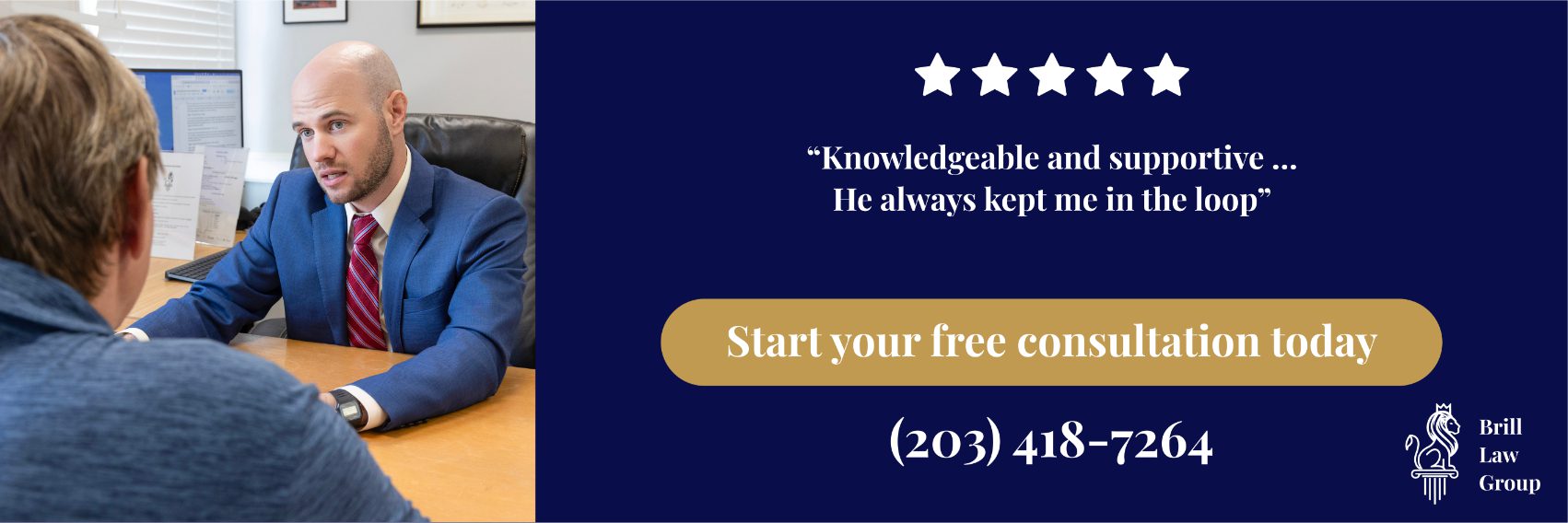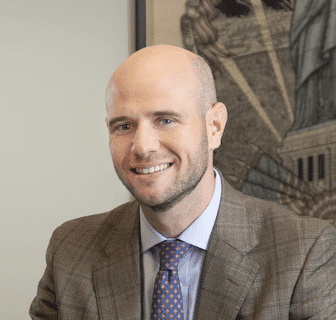Connecticut Brain Cancer Misdiagnosis Lawyer in Connecticut
On This Page
Brain Cancer Misdiagnosis Lawyer in Connecticut
If you or someone close to you has faced a brain cancer misdiagnosis in Connecticut, it is important to understand the legal avenues available to you. A Connecticut medical malpractice lawyer can guide you through the intricacies of medical malpractice claims, ensuring your rights are upheld while you seek justice. The emotional and financial toll of such misdiagnoses can be overwhelming, and knowing how to understand this landscape is important, which is why it is beneficial to hire a brain cancer misdiagnosis lawyer in Connecticut from the Brill Law Group.
Understanding Brain Cancer Misdiagnosis in Connecticut
Comprehending brain cancer misdiagnosis in Connecticut can be a heart-wrenching experience for patients and their families. Misdiagnosis can lead to unnecessary treatments, delayed care, and ultimately, negative health outcomes. Brain cancer awareness is critical in recognizing how critical timely and accurate diagnosis is for effective treatment.
Several factors contribute to misdiagnosis, including:
- Complex Symptoms: Symptoms of brain cancer can mimic other conditions, complicating diagnosis.
- Inadequate Testing: Relying solely on initial imaging studies may overlook subtle signs of brain tumors.
- Communication Gaps: Misunderstandings between healthcare providers and patients can affect the diagnostic process.
Medical ethics play a significant role in ensuring that patients receive the highest standard of care. When brain cancer misdiagnosis occurs in Connecticut, it raises questions about whether medical professionals followed ethical guidelines. If you or a loved one has faced brain cancer misdiagnosis in Connecticut, it may be beneficial to consult a brain cancer misdiagnosis lawyer in Connecticut who can help you understand the legal complexities. At Brill Law Group, we acknowledge the challenges you face and can guide you through the intricacies of seeking justice for medical negligence. Taking action is important to hold accountable those responsible for the misdiagnosis and its consequences.
Signs and Symptoms of Brain Cancer in Connecticut
As a Connecticut brain cancer misdiagnosis lawyer, recognizing the signs and symptoms of brain cancer is important for early detection. You might experience common symptoms like persistent headaches, changes in vision, or unusual mood swings that could indicate a serious issue. Understanding these early warning signs can lead to timely diagnosis and treatment, ultimately impacting your health and well-being.
Common Brain Cancer Symptoms in Connecticut
Brain cancer misdiagnosis can lead to serious consequences, making it important to recognize the common brain cancer symptoms early on. Being aware of these symptoms can help you advocate for your health and seek appropriate care.
Some common symptoms of brain cancer include:
- Headaches: Frequent or severe headaches that may worsen over time.
- Seizures: Unexpected seizures, even if you haven’t had them before.
- Cognitive Changes: Difficulty concentrating, memory issues, or changes in personality.
- Vision Problems: Blurred or double vision, or other visual disturbances.
- Speech Difficulties: Trouble speaking or understanding speech.
If you notice these symptoms, it’s important to consult a Connecticut healthcare professional immediately. Early detection may improve treatment options and outcomes. Common treatments can include surgery, chemotherapy, or radiation therapy, depending on the type and stage of the cancer.
If you or a loved one has faced a misdiagnosis, a brain cancer misdiagnosis lawyer in Connecticut can provide guidance on your rights. At Brill Law Group, we recognize the importance of patient advocacy and are here to support you in steering through these challenging situations. Recognizing common brain cancer symptoms is an important step in ensuring timely and effective treatment.
Early Warning Signs
Noticing changes in your health can be alarming, especially when it comes to serious conditions like brain cancer. In this discussion about early warning signs, it’s important to recognize the early symptoms that could indicate something more serious. Awareness of these signs can lead to timely consultations with Connecticut healthcare professionals and better patient experiences.
Here are some early warning signs of brain cancer you shouldn’t ignore:
- Persistent headaches that worsen over time
- Seizures, even if you’ve never had them before
- Sudden changes in vision, such as blurriness or double vision
- Unexplained changes in mood or personality
If you or a loved one notice these symptoms, it’s important to seek medical advice promptly. A brain cancer misdiagnosis lawyer in Connecticut from the Brill Law Group can assist if you face a misdiagnosis or inadequate care related to these symptoms. Understanding these early signs can empower you to take action and advocate for your health.
Importance of Diagnosis
Recognizing the importance of diagnosis when it comes to brain cancer can’t be overstated. A timely and accurate diagnosis is important for effective treatment, as it directly impacts the Connecticut patient’s outcome. Early detection can greatly improve survival rates, making it necessary to understand the signs and symptoms of brain cancer.
Common symptoms include:
- Persistent headaches
- Seizures
- Nausea and vomiting
- Changes in vision or speech
- Memory issues or confusion
The consequences of misdiagnosis can be severe, leading to delays in treatment and potentially worsening the condition. If a Connectiut healthcare provider fails to recognize these symptoms or misinterprets them as other conditions, your health can deteriorate rapidly.
It’s important to advocate for yourself or your loved ones if you suspect brain cancer. If you’ve experienced a misdiagnosis, consulting with a Connecticut misdiagnosis lawyer may help you explore your options for accountability and compensation. The Brill Law Group understands the nuances of these cases and can provide guidance as you go through this challenging situation. Taking action can guarantee that you receive the care you deserve and help prevent similar mistakes for others.
The Role of a Brain Cancer Misdiagnosis Lawyer in Connecticut
When facing the aftermath of a brain cancer misdiagnosis in Connecticut, you might feel overwhelmed and uncertain about what to do next. A brain cancer misdiagnosis lawyer in Connecticut can help you during this difficult situation, ensuring you receive the support and guidance you need. One role of a Connecticut medical malpractice lawyer is to advocate for patients like you who have suffered due to medical negligence.
Your Connecticut brain cancer misdiagnosis lawyer can assist in several ways:
- Gathering Evidence: Collecting medical records and expert testimonies to build your case.
- Negotiating Settlements: Working with insurance companies to secure fair compensation for your suffering.
- Filing Legal Claims: Ensuring all paperwork is completed accurately and on time.
- Providing Emotional Support: Offering guidance and reassurance throughout the legal process.
With the right legal representation, you can focus on your health while your lawyer handles the complexities of your case. At Brill Law Group, we recognize the importance of patient advocacy and are dedicated to fighting for your rights in the face of medical negligence. Allowing a brain cancer misdiagnosis lawyer in Connecticut to advocate for you can make a significant difference in the outcome of your situation.
Why Brain Cancer Misdiagnosis Happens
Misdiagnosis happens more often than you might think, especially with conditions like brain cancer. Understanding diagnostics is important, as various factors can lead to incorrect conclusions. For instance, symptoms of brain cancer can mimic other illnesses, such as migraines or anxiety, causing confusion in diagnosis.
Additionally, patient experiences may vary greatly, and not all individuals present typical symptoms, which complicates the diagnostic process. Factors like limited communication between patients and doctors can also play a role. If you’re feeling unheard or misunderstood, it can impact the information you share, leading to misinterpretation.
Other issues include:
- Time constraints: Doctors often face pressure to see many patients, which can shorten consultation times and limit thorough examinations.
- Diagnostic tools: While technology has improved, imaging tests can sometimes mislead, missing small tumors or misidentifying benign growths.
- Bias: Physicians may rely on their past experiences, which could result in overlooking less common conditions.
Legal Options for Affected Patients in Connecticut
Facing the aftermath of a Connecticut brain cancer misdiagnosis can leave you feeling lost and overwhelmed. Understanding your legal options for affected patients is critical in this challenging time. As you go through this difficult journey, knowing your patient rights and potential legal remedies can help you regain a sense of control.
Here are some legal options to contemplate:
- Consult a brain cancer misdiagnosis lawyer in Connecticut: They can help assess the circumstances surrounding your misdiagnosis.
- File a medical malpractice claim: If negligence played a role in your misdiagnosis, you might be entitled to compensation.
- Gather evidence: Collect medical records, test results, and any communication with healthcare providers that could support your case.
- Seek emotional support: Legal battles can be taxing, so contemplate counseling to help you cope with the emotional toll.
Steps to Take After a Brain Cancer Misdiagnosis in Connecticut
Facing a brain cancer misdiagnosis in Connecticut can be overwhelming and distressing. You may feel lost and unsure of what to do next. Here are some steps to take after a misdiagnosis that can help you during this challenging situation.
- Seek a Second Opinion: Consult another Connecticut medical professional to confirm or refute the initial diagnosis. A different perspective can provide clarity and guide your treatment options.
- Document Everything: Keep detailed records of your symptoms, medical history, and any communications with healthcare providers. This information can be important for understanding misdiagnosis causes.
- Know Your Patient Rights: Familiarize yourself with your rights as a patient. You deserve transparency from your healthcare providers and the ability to advocate for your health.
- Contact a Connecticut Medical Malpractice Lawyer: If you believe negligence played a role in your misdiagnosis, consider reaching out to a Connecticut brain cancer misdiagnosis lawyer. They can help you understand your legal options and rights.
- Consider Counseling: Emotional support is important after a misdiagnosis. Talking to a professional may help you cope with the stress and uncertainty.
Taking these steps can empower you as you seek the care and justice you deserve.
Seeking Support and Resources
After taking important steps following a Connecticut brain cancer misdiagnosis, it’s crucial to seek support and resources that can help you through this challenging time. Managing the aftermath of a misdiagnosis can be overwhelming, but you don’t have to face it alone. Connecting with others who understand your situation can provide comfort and insight.
Consider exploring the following resources:
- Support groups: These provide a safe space to share experiences and gain emotional support from others facing similar challenges.
- Financial assistance programs: Look for organizations that offer help with medical bills or other expenses related to your treatment.
- Counseling services: Professional counselors can assist with coping strategies and emotional healing.
Legal resources: Consulting a brain cancer misdiagnosis lawyer in Connecticut can guide you through your rights, especially if you’re considering legal action.



